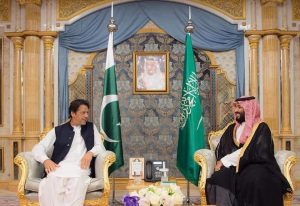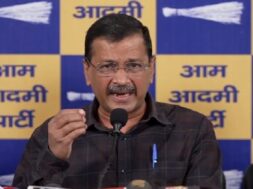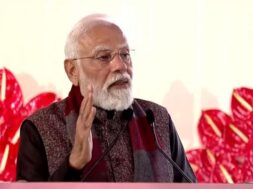
Manas Dasgupta
NEW DELHI. Oct 28: In a double blow to Pakistan, the most revered country in the Muslim world – Saudi Arabia – has reportedly removed Pakistan-occupied Kashmir and from Pakistan’s map and has also refused it permission to hold public events to observe as a “black day” the accession of Jammu and Kashmir to India.
According to news agency reports, some PoK activists based in London gave the information that Saudi Arabia had removed PoK and Gilgit-Baltistan from Pakistan’s map. “Saudi Arab removes Pakistani occupied Jammu Kashmir and Gilgit-Baltistan from Pakistan’s map!!!!,” one Amjad Ayub Mirza tweeted on Wednesday.
He also tweeted a picture that was captioned, “Saudi Arabia’s Diwali gift to India– removes Gilgit-Baltistan and Kashmir from Pakistan’s map,” the picture’s text read.
In a similar set-back to Pakistan, Saudi Arabia as well as Iran, the Sunni and Shia shoulders of Islam, refused to allow Pakistan missions to hold public events to observe the 27 October anniversary of Jammu and Kashmir’s accession to India as a Black Day, a departure from previous years signaling new grouping by the Islamic countries and Pakistan’s shifting equations in West Asia.
The Saudi Arabia’s removal of PoK from Pakistan map came in a 20 Riyal banknote the country released to commemorate its presidency of organising the G-20 Summit on November 21-22. The world map displayed on the banknote does not show Gilgit-Baltistan (GB) and Kashmir as parts of Pakistan, media reports said.
Experts in international affairs feel that Saudi Arabia and Iran’s strong reactions against Pakistan was a reflection of Pakistan’s equations in the Middle East, in large measure a fallout of its growing partnership with Turkish president Recep Tayyip Erdogan who is attempting to establish Turkey’s prominence in the Middle East, quite like the Ottoman empire some 500 years ago.
Media reports say that Saudi Arabia’s step is nothing short of an attempt to disgrace Pakistan, which also seems to be “adapting to its new bloc”.
The Ministry of External Affairs (MEA) in September stated that they have seen reports regarding elections to the so-called “Gilgit-Baltistan” Assembly to be held on November 15 and took a strong objection to it.
“The Government of India conveyed strong protest to Pakistan Government and reiterated that Jammu and Kashmir and Ladakh, including the so-called Gilgit and Baltistan, are an integral part of India,” the MEA stated.
The Imran Khan government previously released a new political map of Pakistan, claiming Indian territories of Junagadh, Sir Creek and Manavadar in Gujarat as well as the entire Jammu and Kashmir and a part of Ladakh.
Pakistan traditionally observes October 27, the day the then king of Kashmir singed the bill of accession to India, as a “black day.” But this year Saudi Arabia and Iran, the Sunni and Shia shoulders of Islam, refused it permission to hold public events on the occasion on their soil.
Media reports said Pakistan embassy in Iran had proposed an event in Tehran University to observe the Black Day. But Tehran surprised Islamabad when it communicated its refusal to allow the event. The embassy later settled for a webinar. Islamabad’s plans to hold a public event within the Pakistani consulate in Riyadh were also blocked by the Kingdom of Saudi Arabia.
Some of the Islamic countries apparently are at odd’s end against Pakistan due to its proximity to Turkey which was on full display this month at the Financial Action Task Force (FATF) plenary session when Ankara turned out to be the only among the 39 members to push hard for keeping Islamabad out of “grey list” for allegedly financing terror activities.
Prime Minister Imran Khan and Turkey’s Erdogan have been partnering to form a new radical Islamic axis as opposed to the established Sunni order led by Saudi Arabia and Shia order led by Iran.
The two radical axis countries – Malaysia, who under Mahathir Mohammed was part of this new axis, has now taken a back seat – also made public their opposition to the United Arab Emirates establishing full diplomatic relations with Israel. Pakistan’s statement was much muted, given that it is still in the process of shifting sides, but Erdogan’s first reaction was a shot across the bow. He threatened to break off relations with UAE.
But the freshly-minted partnership has its downside. Riyadh’s refusal to allow the Kashmir event was one. Saudi Arabia’s decision earlier this year to demand that Islamabad immediately repay a $ 3 billion loan after Pakistan foreign minister Shah Mahmood Qureshi tried to shame the royal kingdom into holding ministerial-level meet to discuss revocation of Article 370 in Jammu and Kashmir was another. Analysts believe Imran Khan eventually had to send army chief Qamar Bajwa to Riyadh to cool its tempers. Gen Bajwa didn’t get the meeting with Saudi Crown Prince Mohammed bin Salman that Islamabad had hoped for but is believed to have helped paper over the deep cracks in the relationship.
Analysts also suggest that Erdogan, who is seen to aspire for a Turkey’s leadership role in the Islamic world, also has been rebuffed by some of the Islamic countries for trying to expand its influence and change the equation in Asia by joining hands with Pakistan.
















